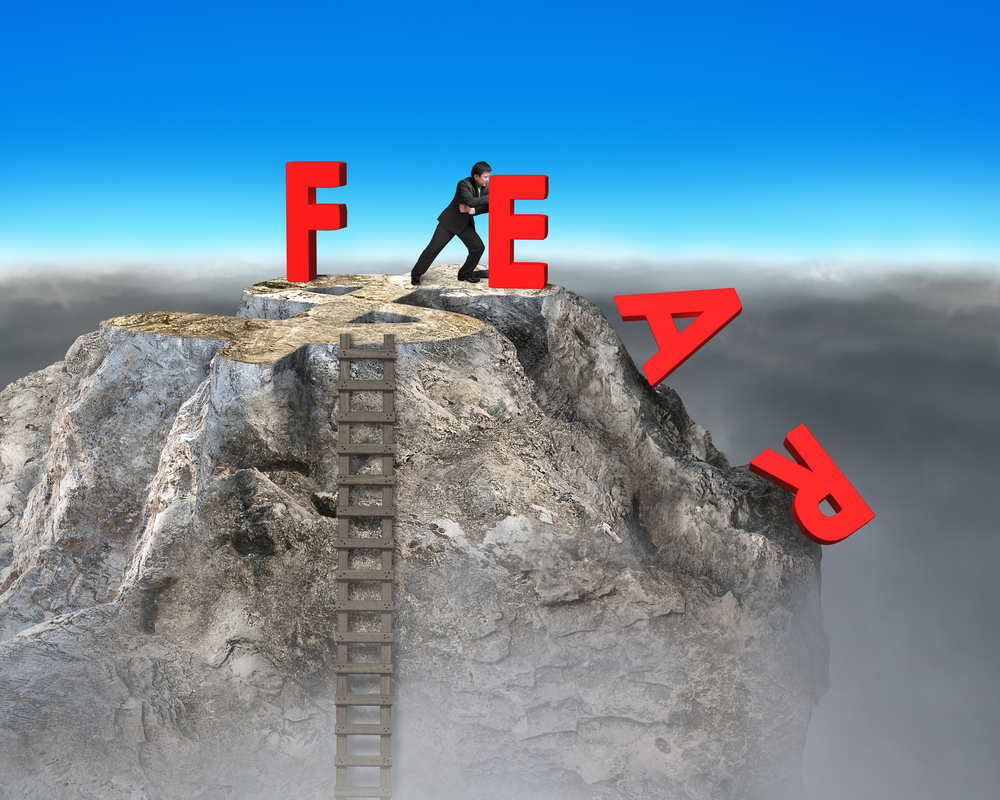See Previous parts: FearBusters: Conquering our Fears, Part 1, Part 2, Part 3, Part 4, Part 5
Part 6: Fear of Change
Have you ever asked yourself why you do what you do every day? What I’m specifically referring to are your habits. I’m willing to bet that you sleep on the same side of the bed every night. I’m willing to bet that you eat a similar breakfast every morning, drive the same route to work or school, listen to the same stations on the way there, start your work day or school day in the same way, eat the same lunch or at the same restaurants every few days and so on and so forth. Have you ever asked yourself why you do things the way you do?
Well, if you haven’t yet, I’m about to tell you why; you do them because you’ve always done them. They’re simply actions that have been repeated over and over again to the extent that they become a part of your subconscious and you do these things without even thinking. You see most of our lives are run on autopilot. We simply don’t think about most of the things that we do. Think about when you drive your car now as compared to the first time you tried to drive your car. The first time you drove a car, everything was foreign to you so you had to consciously check all the mirrors, change the seat position, try to mentally manage your feet on the pedals and choosing which pedal to push when; where to shift the gears; keep track of your speed and so many other things. Do you still have to consciously do these things? Of course not! After some time, it becomes second nature to you.
Keep supporting MuslimMatters for the sake of Allah
Alhamdulillah, we're at over 850 supporters. Help us get to 900 supporters this month. All it takes is a small gift from a reader like you to keep us going, for just $2 / month.
The Prophet (SAW) has taught us the best of deeds are those that done consistently, even if they are small.
Click here to support MuslimMatters with a monthly donation of $2 per month. Set it and collect blessings from Allah (swt) for the khayr you're supporting without thinking about it.
In order to understand people’s fear of change, one must first understand the difference between the subconscious mind and the conscious mind. The conscious mind is the one we use very seldomly in comparison to the subconscious mind. The conscious mind is when we make conscious decisions and are fully aware of our decisions while we’re making them. This often occurs when we are faced with a new or unique situation. Let me give you an example: On the days in which our daily schedule is disrupted, we have to consciously redesign our days. For instance, if you have children and one of them gets sick and has to miss school, you or your spouse’s day has to be consciously reworked and re-planned. The conscious mind has to do that. The subconscious mind is the one created by repeated actions over time. It’s exemplified by the things you do without thinking, which is most of what we do.
So why am I mentioning all of this?
I am saying this simply to state that people fear change most often not because of what that specific change will cause in their life, but for the simple fact that it’s something uncomfortable; something they’re not used to. In other words, change forces us to make conscious decisions that may disrupt our subconscious patterns, which always leads to a feeling of unease and discomfort.
I want you to really think about this, because it requires thought and leads to a deeper understanding of human nature itself.
Do you have a bad habit or an addiction that you know you shouldn’t have, but can’t seem to get rid of it? It’s because you haven’t understood or mastered the art of rewiring your subconscious. I will discuss this in more detail at the end of the article.
The fear of change like all other fears can be completely debilitating, causing you to get ‘stuck in your ways’ and not progressing in life. This fear causes many people to stay in miserable jobs, unhealthy relationships, keep poor friends despite the fact that we know they’re not good to be around, stay in a place or city that’s not conducive to growth and progress, or even stick to careers that we neither care about nor enjoy. We simply do not change, because we are comfortable with what’s familiar and we are afraid of the unknown that comes with change and risk. The problem with having this fear, I hope, is quite obvious by now.
For many of us, change is necessary in order to improve our lives. Some of us need to go through a physical change in order to improve our health, while others need to undergo a spiritual change in order to improve our faith. Being comfortable with change is a critical factor to living out our best lives possible. I don’t know a single successful person who hasn’t taken risks and been forced to change themselves and some of their bad habits in order to achieve their goals.
The fear of change, is always worse than the change itself.
3 Principles to Overcome this Fear:
-
Understand and accept the fact that change is always occurring, whether you’re aware of it or not.
Take a moment to think back on the past 5 years. Have you changed within the past 5 years? Has your body changed? Do you think differently now than 5 years ago? How about spiritually? Of course you have, because we all have and we will all continue to change day in and day out. Our hair and nails get longer by the day; the climate and weather changes daily; even the friends and family that we have around us changes often. Change is generally a constant state in our lives and in our world, so it’s best to accept it and adopt its inevitability.
-
Until you make what is subconscious conscious, you will get the same results you’ve always gotten and you’ll call it fate.
You MUST read this principle over and over again to really understand its incredible implications. This short statement is the key to understanding how to change any and all of our habits. It all starts in the mind. As I mentioned earlier, our subconscious mind is the one that really leads most of what we do on a daily basis, so in order to change our behavior we must start by rewiring our subconscious mind. The way to do that is to bring our subconscious to the surface and make it conscious. Simply put, we have to re-examine what we do all day every day and make the conscious design to recreate better habits. For example: let’s say you have a goal of becoming healthier but you have bad eating habits, so in the morning the first thing you do is grab a quick bowl of sugary goodness in the form of your favorite brand of cereal and then head out to work or school. Knowing that your goal is to become healthier and more physically fit, you have to make the conscious decision of replacing the sugary cereal with healthy fruits, oatmeal or another alternative. By doing that simple step, you are in actuality consciously making a decision to change. If that conscious action is repeated day after day, then that habit of eating fruit or oatmeal becomes part of your subconscious and you have just accomplished what so many people fail at, which is to change a bad habit. This process can only happen when you analyze your subconscious life, bring it to the conscious level and redesign it based on what is best for you.
I’ve gone into quite a bit of detail in discussing this fear because I feel that it is one of the fears not discussed often enough and requires special attention and focus.
-
To get the most out of life, you have to get comfortable with being uncomfortable, which means that you have to get comfortable with change.
Up Next – Part 7: Fear of Failure













marmar
May 19, 2015 at 8:27 AM
Salam Aleikum Rahmatullah Wabarakatu
When I read an article of this nature I ask myself: What is the significance to the exercise of my faith and to the collective exercise of Islam? When I read your article my impression was that as long as there are cultural biases, addictions, misbehaviors, it is important for us to consider the place of change in our lives, however we must also consider the importance of not changing those things which otherwise would be bidah/innovations or would be change to our detriment.
In our Muslim world there are things that definitely need to change, others that could change and others that would be innovations to change. I see a trend towards focusing equal time to changing all three. Fitnah arises often times from the focus on the wrong changes. I like your article but I don’t think that it addresses that aspect of change and it is important to address it and it is important precisely because people like you are influential and your voice can carry a lot of weight.
Please forgive any mistake I might have made. Jazakalakhair
Adnan Jalali
May 29, 2015 at 5:21 AM
Marmar…thank you for your honest feedback.
Mohammad Yusha
May 19, 2015 at 10:02 AM
Great article. Keep it up.
Adnan Jalali
May 29, 2015 at 5:22 AM
Thank you for your kind words Mohammad.
Aisha
June 18, 2015 at 9:10 AM
Assalamu’alaikum
Thank you for the article. Are there any books you would recommend for furth reading? I struggle enormously changing certain habits. Partly due to fear. I imagine that NLP deals with changing the way we think is that correct?
Adnan
June 27, 2015 at 9:40 AM
Thank you for the comment Aisha. The best book thar I’ve ever read centered around habits is ‘The Power of Habit’ by Charles Duhigg.